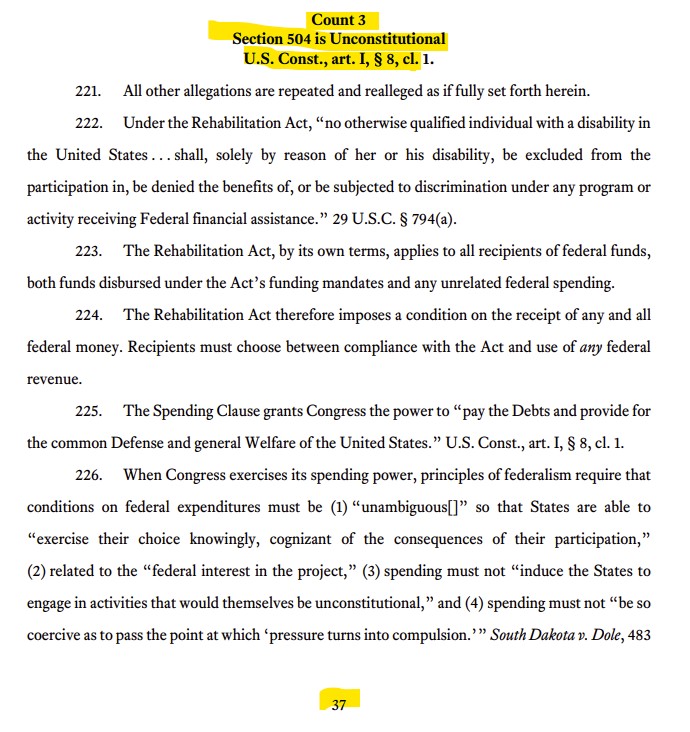ID: ASL interpreted version of DREDF Texas vs. Beccera, courtesy DREDF.org
Section 504 is a civil rights statute that says any entity that gets money from the federal government (funding, grants, etc.) cannot discriminate on the basis of disability. It is part of the Rehabilitation Act of 1973 law. This protection impacts education, healthcare, immigration services, child services, emergency services, clinical research, private companies who get federal grants, and all federal agencies and buildings.
Many people are most familiar with Section 504 through the use of 504 Plans to support disabled students at school. 504 Plans provide accommodations in public school settings like ASL interpreters, closed captions, ramps, preferential seating, extra time on tests, quiet testing environments, access to braille, audiobooks, FM systems, speech-to-text and AAC devices, and more.
Section 504 is a kind of statute known as a “spending clause.” There are also other civil rights spending clauses that protect people from discrimination on the basis of race and sex.
In 2024, the Department of Health and Human Services (HHS) issued some updated guidance on Section 504. These are called the “Final Rule.” The pandemic revealed extreme inequities in healthcare remain–like hospitals denying lifesaving care on the basis of disability–so the Final Rule clarified who must follow 504, and what it means in the time of the internet. The Final Rule says 504 protection covers include all doctors and healthcare offices that accept Medicaid or Medicare, and their medical equipment, telehealth and websites. It also impacts programs for child services and independent living.
What is Texas vs. Becerra?
Texas vs. Becerra is a lawsuit with two main parts. One part asks the judge to strike down the Final Rule. The other part asks the judge to declare Section 504 as a whole unconstitutional and stope its enforcement.
Isn’t There Something to Do with Trans Folks in the Suit?
Sort of! The TLDR is that biased Attorneys Generals are using transphobia as a cover to get others to join in on their ableism. Jump down to the last section on this page to read more about the misconceptions.
What Would Happen if These States Win?
If the states succeed in striking down the Final Rule, disabled people’s enumerated protections under 504 will be taken back to what they were fifty years ago, without accounting for the internet, mobile devices, pandemic healthcare and more. Disabled people’s rights to live independently in-community would be impacted.
If the states succeed in having the entirety of Section 504 declared unconstitutional, all protections will be lost, including in education.
504 and the ADA, as well as other protective spending clauses, are linked in the way they’re enforced, so striking down 504 could endanger the enforcement mechanisms of the ADA as well.
This would also be a dangerous legal precedent for other spending clauses, like anti-race and sex based discrimination. It could set the stage for those protections to be declared unconstitutional, too.
Take Action: What Can We Do?
Seventeen states are currently signed on to Texas vs. Beccera.

If you live in one of the 17 states signed onto this case, contact your Attorney General today. Let them know attacking the Final Rule and Section 504 is not ok, and ask them to drop out of the lawsuit. Here are scripts you can use while contacting your AG.
If you don’t live in one of these states, you can still contact your Attorney General. Progressive AGs can watch this litigation, file an amicus brief and more.
Here is contact information for all 50 Attorneys General
What if my Attorney General Tells me the Case is Inactive, or Doesn’t Really Attack Section 504?
Push back on misinformation and disinformation!
“This is a case about gender dysphoria.” The preamble to the Final Rule document mentions the ongoing legal inquiry into whether gender dysphoria can be classified a disability. There are currently several other court cases examining this question, and courts are split on it. The original 504 statute does not protect folks with gender dysphoria, and though Final Rule discussions mention the ongoing question in the courts, it makes no enforceable determination, or policy guidance within the text of Final Rule itself. This is political spin used to rally conservatives to the suit. However, it is important to note that there are trans disabled folks, and that the disability community stands with all LGBTQ+ folks. You can read HHS’s Final Rule document here.
“This case only takes issue with a small part of the Rule.” The suit has multiple parts. One part attacks the Final Rule, and one part explicitly asks the judge to declare all of Section 504 unconstitutional. Point your AG to page 37 of the complaint, under the heading “Count 3: Section 504 is Unconstitutional.” The full text of the complaint is here.
“The case is inactive.” The case is not inactive. The case has been paused until February 25th, 2025 in the wake of the new administrative transition. The DOJ and other involved parties are required to provide a status update on that day.

Need to fact-check something else? Disability Rights and Education Defense Fund has a great FAQ document here, as well as many other resources about this and other attacks on their site: www.dredf.org
Spread the Word!
The media isn’t reporting much on this case. Download our flyer and share it, especially offline. Disability affects people of every race, class, age, sex, gender, national origin, political affiliation and religion. People who aren’t spending much time on social media also need this info, and we are all stronger together.